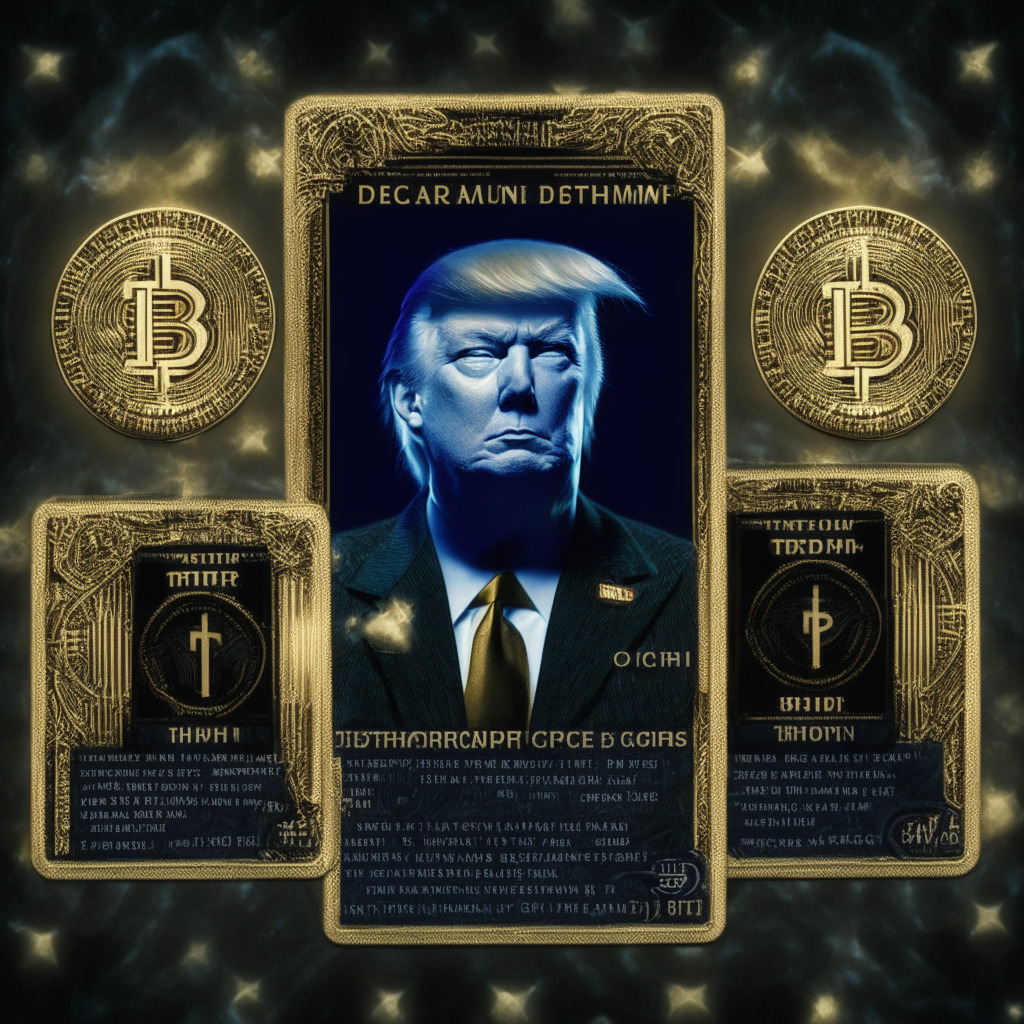“Russia’s Central Bank Digital Currency (CBDC) – the digital ruble – can play a significant role in curbing black market dollar trading, says former government official, Sergei Kalashnikov. It could minimize the chance of official currency entering the black market, adjust ruble’s value and impact dollar’s growth against it.”
Search Results for: EAK Digital
Navigating the Future of Finance: Analyzing Project Sela’s Digital Currency Triumphs and Trials
“Israel and Hong Kong have completed their retail central bank digital currency (rCBDC) test runs, focusing on private participation, inclusivity, and security. Project Sela merges cash characteristics with digitization benefits, addressing policy, security, technology, and legal issues. However, real-time gross settlement (RTGS) system limitations and developmental challenges remain.”
Gracy Chen’s Dual Approach: Championing Crypto Safety Amid an Evolving Digital Landscape
Gracy Chen, managing director of Bitget cautions about privacy concerns with Worldcoin tokens potentially exposing personal information. She advocates for maintaining skepticism in the dynamic crypto market while also acknowledging the opportunities found within the industry. With a balanced perspective, she deconstructs the complexities of the blockchain technology and digital currencies.
Navigating the Political Minefield of Central Bank Digital Currencies (CBDCs)
“Central bank digital currency (CBDC) enthusiasts face political opposition, despite the digital euro’s benefits such as EU-wide usability, unmatched privacy in digital payments, and independence from foreign payment providers. Opponents worry CBDCs could enable governmental overreach and surveillance, shifting discussions to the credibility of central banks. “
Balancing Cryptocurrency Taxation: Equity and Evasion in the Digital Asset Space
The Blockchain Association, a U.S-based crypto advocacy group, submitted legislation proposals for equal taxation of crypto and non-crypto assets. The recommendations support the Keep Innovation in America Act, which aims to revise reporting standards for cryptocurrency transactions. Concerns arise around potential tax evasion and proposed digital asset mining excise tax.
Hong Kong’s Digital Yuan Testing Phase II: A Leap to Future or a Threat to Privacy?
“Hong Kong is advancing on the second phase of technical testing for China’s digital yuan, focusing on the digital wallet’s top-up functionality via the Faster Payment System. Concomitantly, the city grapples with challenges balancing financial innovation and consumer protection in the fast-paced digital currency landscape.”
Exploring OpenSea: Transforming Digital Asset Ownership Through NFTs and Facing Challenges
OpenSea, a decentralized marketplace for nonfungible tokens (NFTs), is revolutionizing the digital ownership economy. However, its reliance on cryptocurrency and possible exposure to fraudulent NFT listings are potential drawbacks. Despite these limitations, OpenSea continues to transform our interaction with digital assets.
Digital Yuan and ASEAN: Exploring Opportunities, Challenges and the Undeniable Impact on Global Trade
China is looking to showcase the capabilities of its Central Bank Digital Currency, the digital yuan, to ASEAN nations, potentially indicating a cross-regional usage. Political diversity among ASEAN members and their affiliations could, however, influence this dynamic. Amid de-dollarization efforts in the region, Beijing’s digital yuan could find an increasing role. Opportunities may also arise from Bank of Indonesia’s interest in cross-border CBDC usage.
Tencent’s AI Leap Amidst US-China Tensions: Breaking Down the Hunyuan System
“Tencent has introduced its ‘Hunyuan’ AI system, a multimodal large language model similar to OpenAI’s ChatGPT. The system supports functions like image creation, text recognition, and customer service, and can contribute to sectors such as finance, social media, and e-commerce.”
Groundbreaking: U.S. Poised for First Spot Ether ETFs – A Game Changer or A Risk Too Far?
“Cboe’s BZX exchange is preparing for a historical first with the potential launch of the U.S.’s maiden spot ether exchange-traded funds (ETFs). The SEC’s approval of such a move would mark a new era of crypto trading, including on-the-spot ether exchanges via ETFs. The decision may reshape the financial landscape, creating a new entry point for traditional investors into the realm of digital currency.”
Anoma Foundation’s Privacy-Prioritized Blockchain: Breaking New Ground or Stirring Trouble?
Anoma Foundation is advancing with privacy-focused blockchains by creating a standalone blockchain for Namada protocol. Namada, founded by Awa Sun Yin, features zero-knowledge cryptography, facilitating private transactions across Ethereum or Cosmos networks. It can embed privacy features in any digital asset and decentralized apps without altering their original code.
Digital Yuan to Dominate Retail Platforms: A Chance or Challenge for Crypto Evolution?
“The Bank of China declared retail platforms should offer digital yuan as a payment option. Commercial banks and payment platforms like WeChat and Alipay are urged to integrate Central Bank Digital Currency (CBDC) via QR codes. No specific technical details about integration or security measures have been provided. The move raises concerns about the future of other cryptocurrencies and their relationship with traditional banking systems.”
Digital Yuan Reinventing Retail: A Fascinating Future or a Risky Undertaking?
“Changchun Mu, from the Digital Currency Research Institute at PBOC, advocates for wider digital yuan use in retail. He envisions wallet providers adhering to financial licensing standards and a standardized QR code system for efficient transactions. Trials for e-CNY have expanded to 26 locations across 17 cities.”
Bitcoin Whales Expanding Their Wealth Despite Price Slumps: Breakthrough or Breakdown?
“Bitcoin ‘whales’ have significantly boosted their stakes, increasing assets by $1.5 billion in late August. This growth occurred despite a slump in BTC’s price, suggesting increased optimism among institutional investors. This follows a court resolution pushing for Grayscale to list a spot Bitcoin exchange-traded fund (ETF) in the U.S.”
Adidas’ Web3 Manoeuvre: Courting Crypto Generation While Fueling Digital Art Innovation
‘Residency by Adidas’ offers a new platform for web3-powered digital artists to innovate and create valuable connections within the Adidas community. This venture seeks to bridge physical and virtual worlds with collaborations and its introduction takes place at the Korean Blockchain Week with partnership by NFT Now.
Diversifying Crypto Investments: HashKey Capital’s Novel Strategy and the Implications for Digital Assets
Hong Kong’s HashKey Group, through HashKey Capital, is taking an interesting approach with its new fund, planning to allocate less than half of its portfolio to Bitcoin and Ethereum. The strategy seems to suggest an increased focus on alternative cryptocurrencies, driven by the weaker performance of the Hong Kong stock market and the rising demand for above-market returns in cryptocurrency.
Navigating the Paradox of Worldcoin: Advancing Digital Identification vs Privacy Concerns
Worldcoin, a blockchain venture, recently enrolled over 9500 users in Argentina in one day. The project uses the users’ irises to verify their humanity, to combat AI programs mimicking human interaction. Despite criticisms concerning data privacy, sign-ups continue to surge worldwide. Interestingly, this project presents a paradox when examining technology, balancing digital identity verification against potential privacy compromises.
Worldcoin: Decentralizing Digital Identity or Invading Privacy?
“Worldcoin, despite controversies, showcases a potentially groundbreaking use of blockchain: creating an immutable, biometrically authenticated digital identity. While the project faces both ethical dilemmas and security concerns, its potential in revolutionizing finance, political systems, and social structures cannot be overlooked. A critical question remains: trusting a private entity with our digital identities.”
Swift’s Blockchain Integration vs Central Bank Digital Currencies: A Comparative Analysis
Swift’s recent report asserts that short-term blockchain integration is a more feasible solution for market development than unifying Central Bank Digital Currencies and tokenized assets on one ledger. It suggests that connecting existing systems with blockchains addresses interoperability issues between diverse blockchain networks, improving efficiency and user experience.
Riding the Digital Wave: Reliance Industries, Blockchain & CBDCs – Bold Innovation or Risky Move?
“Reliance Industries Ltd. plans to venture into blockchain platforms and central bank digital currencies with its new entity, Jio Financial Services. Despite possible risks and uncertainties, the company aligns with India’s digital financial future, emphasizing security and regulatory adherence.”
Harnessing Web3’s Potential: Hong Kong’s Push And Cautionary Tales of Tech Breakthroughs
“Web3, the next iteration of the internet, has been highlighted by the Financial Secretary of Hong Kong, Paul Chan Mo-po, as a main propeller for global technology growth. Chan supports blockchain technologies, non-fungible tokens, GameFi, Play-to-Earn gaming, and immersive entertainment as the driving forces for this digital innovation wave.”
Digital Rights in Jail: FTX Founder’s Legal Battle Raises Questions about Cryptocurrency, Justice, and Internet Access for Inmates
Legal defenders for FTX founder, Sam Bankman-Fried, are arguing for his temporary release or increased consultation dates, citing an infringed right to participate in his defense process through digital resources. This case highlights the possible need for digital inmate rights in the increasingly digital world of contemporary trials, especially in cryptocurrency-related matters. The balancing act between these digital access rights and potential risks of digital forensics manipulation represents a new legal battlefield.
Regulatory Tightrope in Crypto: Worldcoin’s Controversial Practices VS Digital Euro’s Promise
“The Worldcoin project, known for its retinal scans to differentiate humans from bots, is under scrutiny for potential violations of regulations, including data privacy and security threats. This situation highlights the necessity for balanced regulatory adherence as the crypto-space evolves, emphasizing consumer protection. On a separate note, the introduction of the digital euro could harmoniously coexist with private payment solutions, addressing cross-border payment issues and increasing accessibility.”
Breaking Down the Misconceptions: Pursuit of Privacy VS Illicit Activities
“This article examines the tension between the pursuit of individual privacy and law enforcement within the new dynamic of digital transactions and encrypted communications. The piece explores evolving attitudes towards privacy, concerns around governmental access to private information, and the complexities introduced by emerging technologies on privacy rights.”
Breaking Down Launchpad XYZ: The Presale Bonanza and Beyond for Crypto Curious Investors
“Launchpad XYZ’s recent updates prioritise platform engagement over quick trades, introducing a 20% bonus for presale contributors and a five-tiered premium access pass system. The platform also offers AI-powered solutions, educational features, and the Launchpad Quotient (LPQ) to rank and analyze digital assets.”
Banking on the Digital Ruble: Heralding a New Era or Stoking Controversy?
The Russian Central Bank’s proposal classifies the digital ruble, as a “high-quality liquid asset”. This could usher a dramatic reconfiguration of how financial institutions perceive and maintain liquid assets, potentially revolutionizing cross-border payment methods. However, this shift is viewed with apprehension among commercial banks.
Central African Republic’s Groundbreaking Move: Tokenizing Land and Natural Resources
The Central African Republic (CAR) is advancing its Sango project with the aim of tokenizing land and natural resources. This could simplify procedures like online business visa applications and business establishment. It bears the potential to quicken licensing in sectors such as real estate, agriculture, and natural resource exploitation. However, concerns persist over potential unregulated exploitation and the stability of state-sponsored cryptocurrencies.
Breaking Down the Binance-Checkout.com Fallout: Regulatory Complexities in the Blockchain World
“Binance considers suing Checkout.com after their abrupt partnership termination, affecting Binance’s operations and the blockchain world. The case shows challenges in legislating innovative tech, yet accentuates blockchain’s potential, advancing towards a decentralized, secure financial system.”
Mastercard’s Venture into Central Bank Digital Currencies: Paradigm Shift or Adventurous Detour?
“Mastercard has initiated a unique forum for stakeholders in the crypto domain to deliberate on the issue of central bank digital currencies (CBDCs). CBDCs are not the same as cryptocurrencies as they are digitized versions of existing fiat currencies backed by issuing governments. Mastercard’s CBDC alliance aims to foster groundbreaking innovations and efficiencies in the digital asset space.”
Secret Cryptography: Trump’s Hidden Digital Assets Stir Presidential Crypto Debates
Former US President Donald Trump reportedly holds $2.8 million in a digital wallet, a larger sum than previously disclosed. Trump’s venture into the crypto domain began with his NFT endeavor, Trump Digital Collectible Cards. The discovery shows his deepened involvement in cryptocurrency. Meanwhile, other presidential candidates voice their crypto policies, underlining the rising influence of cryptocurrencies on the political stage.
Coinbase Breakthrough: Achieving Regulatory Approval for Crypto Futures in US
“Coinbase has gained approval to list crypto futures in the U.S., nearly two years after initiating the application. The National Futures Association green-lighted Coinbase as a Futures Commission Merchant. This move may reshape the crypto ecosystem, allowing broader financial marketplaces and providing a regulated platform for both institutional and retail investors.”
Dubai’s Digital Leap: Building a Tech-Friendly Hub Welcomes Web3 and AI Companies
“Dubai is offering a 90% registration subsidy for web3 and AI companies to procure operational licenses, aiming to become the biggest pro-tech hub in the MENA region. It’s crafting an ecosystem that facilitates technological breakthroughs and aims to generate 200,000 jobs in the Middle East by 2025.”































